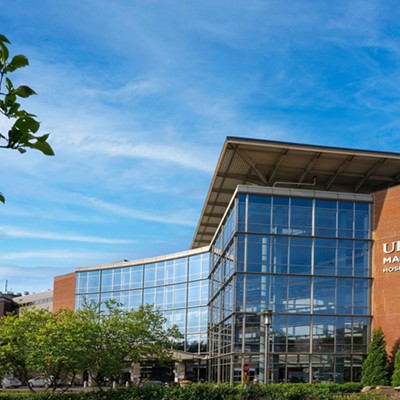"You hear about deconstructing food, but to turn a pierogie into a bunch of Dippin' Dots, with a granita of sauerkraut?"
David Simon, of Greenfield, is marveling at Alchemy's first course, a decidedly fresh take on Pittsburgh's church-hall staple.
In its original sense, alchemy is the magical process by which the ordinary is transformed into a new and valuable commodity. So it's a fitting name for what's taking place at the Doubletree Hotel Downtown, where chef Kevin Sousa and his transformative cuisine have successfully turned Pittsburgh's meat-and-potatoes dining scene into a beacon of avant-garde cuisine. Located at the hotel's Bigelow Grille, Alchemy is a restaurant within a restaurant that offers up to 16 diners a menu they can find nowhere else in town.
"We take a lot of local and seasonal product just like other restaurants do, but treat it differently," Sousa explains. "We might take English peas and turn them into a hot jelly or a warm foam."
Much of the fun is in the participation -- one course needs immediate stirring as it seems to magically transform from a gas into a semi-solid beneath the spoon. Another is shaken up lightly in a sealed box; and several courses require the diner to marry up multiple ingredients, artfully placed across a wide dish. Presentations run from elegant to charmingly absurd (one course arrives suspended from a wire).
"The food lends itself to theatrics" Sousa admits, but hastens to add, "it's unpretentiously pretentious. It's a tongue-in-cheek approach to fine dining." Plus, "it's not weird just to be weird -- the food is interesting and tastes good."
Food comes naturally to the 33-year-old Sousa, who grew up hanging around his family's Italian restaurant in McKees Rocks. ("We catered to the steelworker," he recalls.) He was also a "good eater," filling up on the peasant delicacies proffered by his Italian and Polish forbearers: baccala, octopus, tripe, brains-and-eggs, fried burdock and "all the stinky cheeses."
After high school, Sousa spent five years traveling throughout the U.S. and Europe. Returning to Pittsburgh, he trained at the Pennsylvania Culinary Institute; a two-year externship at a resort in Arizona was followed by stints locally at the Duquesne Club and a four-year stretch at Big Burrito restaurants. In 2005, Sousa opened Bigelow Grille at the Doubletree, with an emphasis on fresh, local and refined updates of the regional blue-collar favorites he grew up with.
While in Arizona, Sousa had read about "molecular gastronomy" (though he prefers the term "modern" or "avant-garde" cuisine). It's a culinary movement, spawned in Europe, that applies science to cooking, using food-safe chemicals and atypical techniques to radically alter foods -- all while preserving the taste and maximizing the presentation. After some extracurricular experimentation, Sousa launched Alchemy in 2006.
"Everyone assumes that [the meal will be] science-y, but it's just food," he says. "And all food is science. Baking soda is a chemical.
"We're just using ordinary stuff that people don't have in their pantry at home -- liquid nitrogen, hydrocolloids, calcium chloride, carrageenan, xanthan ...
"A lot of the techniques we use will evolve into things that Suzy Homemaker is going to do -- why wouldn't you have xanthan in your pantry to thicken a sauce, instead of butter and cream? We're using ingredients that industrial foods have been using for years, but now you have good chefs that are using them."
Alchemy's menu doesn't list "hydrocolloids" or "xanthan" on its menu; it uses tantalizing words such as Kobe beef, blueberry and maple syrup instead. But it gives no hint of how they will be prepared, which infuses each mini-course with giddy anticipation.
Sousa, along with his executive sous chef, Robert Sayre, and Jim Young, "lead server and mouthpiece," form the core of Alchemy. The effusive Young ferries out each course, and enthusiastically explains each dish -- from cooking technique to origin of ingredients to even just what's on the plate (that tiny scoop of "ice cream"? it's celery). Questions are encouraged: "We not trying to keep secrets," explains Sousa.
In a city where "good food" is too often defined by volume, it's heartening to know Pittsburghers are lining up to eat a series of bite-sized courses. Currently there are 16 courses, but Sousa has plans to expand to 20-24 courses while reducing the size of some: "Some will be just a bite."
All those adorable tiny plates do add up to a satisfying amount of food, though they don't run cheap: Alchemy has a fixed price of $100, with an optional wine flight for another $50. But the dinner spans a convivial three-plus hours -- and is unlike any other meal in town.
Simon, a community organizer and self-described epicurean, was thrilled to discover molecular gastronomy occurring locally. "An acute skill set is needed to prepare this cuisine," he says, explaining why he saved up for an admittedly expensive meal. "I recognized what the value of the experience would be."
Because at Alchemy, even the humble pierogie -- folded by hand in McKees Rocks, no less -- is an avant-garde star that draws gasps of delight.
"A lot of people say Pittsburgh is stuck in a different time," continues Simon, "but this is a step forward."














